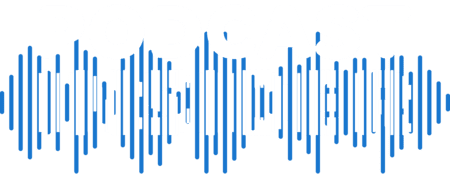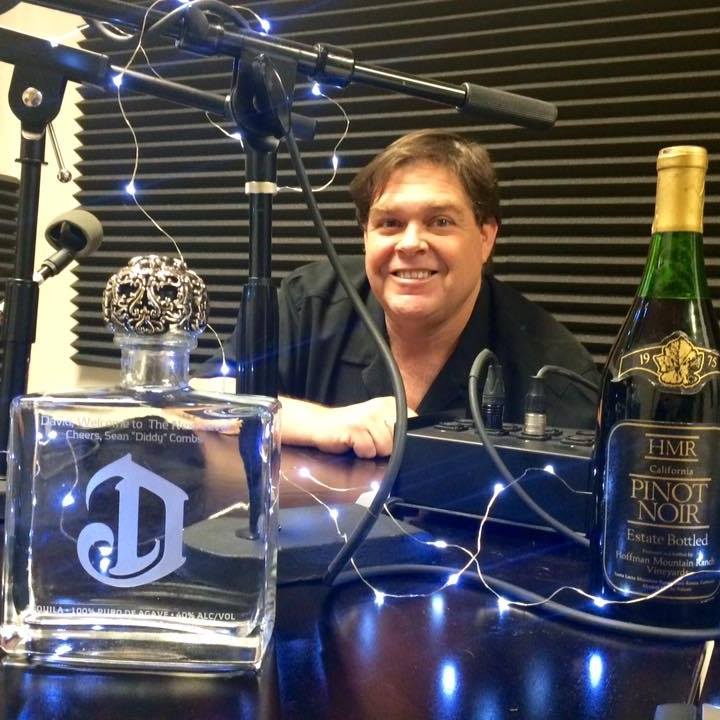
There’s nothing like topping off a meal, sitting in the garden or ending the day with an earthy red, crisp white, or refreshing rosé. No matter the occasion, the world of wines offers endless combinations, palettes of flavors, aromas and textures, each with a unique character and story. Our March Podcaster of the Month, David Wilson, explores and shares those stories as host of the Grape Encounters Radio Podcast. And he does it sans the snootiness of many a sommelier.
Contrary to what hoity-toity critics would like you to believe, wine is meant to be enjoyed by all (at least those of legal age), and Wilson creates a safe space for wine lovers to explore. His extensive audience comprises oenophiles who don’t necessarily care to analyze wine’s harmonious balance of aroma, flavor, body, acidity, tannins or finish (yawn). In other words, these connoisseurs don’t whine about wine.
A marketer and radio personality by trade, Wilson launched Grape Encounters Radio 16 years ago and has traveled the world with an unquenchable thirst for new and exciting vinos and the delectable foods with which they pair. Having moved to Italy from California some two years ago, Wilson retains a deep appreciation for U.S. wines but believes American consumers would be happier if they were enjoying wine the way their European counterparts do – less expensive, greater options, and free-flowing.
As our March Podcaster of the Month, Wilson shares just how he got to the point every dedicated podcaster strives for: His guests are guaranteed and his advertisers are booked indefinitely.
- You have a broad set of talents that include public speaking, MCing, advertising and marketing. What about wine piqued your interest and steered you toward that topic for your podcast?
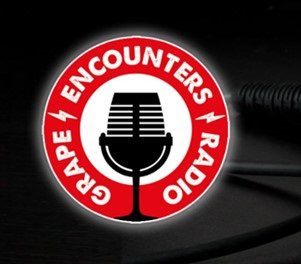 I was a heavy-duty wine enthusiast. I had a wine cellar in my house that could seat about 18 people, so I would have small groups of people come to my house on a pretty regular basis. We would go down to the wine cellar in the evening and remain down there for hours. I was not a wine collector; I wasn’t interested in that. I was interested in wines that were excellent but mostly reasonably priced. I hated, and I mean truly hated, wine snobs, and I would often go into a rant about these people who were going on and on about what they tasted in a wine, knowing in my heart that most of it was total B.S.
I was a heavy-duty wine enthusiast. I had a wine cellar in my house that could seat about 18 people, so I would have small groups of people come to my house on a pretty regular basis. We would go down to the wine cellar in the evening and remain down there for hours. I was not a wine collector; I wasn’t interested in that. I was interested in wines that were excellent but mostly reasonably priced. I hated, and I mean truly hated, wine snobs, and I would often go into a rant about these people who were going on and on about what they tasted in a wine, knowing in my heart that most of it was total B.S.
The thing is, the wine industry catered to these folks, and they were only maybe 5% of the wine-drinking population. The marketing and wine events catered to these people, and I saw this as an opportunity for some kind of programming that was for everyday people who wanted to know more about wine but were afraid to open their mouths because the vocal 5% would typically make fun of anybody who was a novice.
A guy that I met had a small cluster of radio stations, and he offered me the opportunity to do a show on the weekend. I took him up on it, and within a few months, he called me and told me that he was moving me to a prime slot because my show was the most popular show on the weekends. I would go on the air and rail against wine snobs and offer meaningful information to my audience that did not dumb down wine. I also talked a lot about wine-oriented events and adventures, and even ways to tinker with your wine if you open a bottle and it wasn’t to your liking.
As far as podcasting is concerned, we were posting my shows on a website that we had created specifically for the program, and it wasn’t long before we had a pretty good inventory online for people to hear the show. It was a very organic thing, and though I didn’t really take it all too seriously, we started adding a lot of radio stations.
We went for years without a single advertiser because I just didn’t have enough confidence in myself to ask somebody to pay to listen to me drone on about wine. Eventually, that changed, and the program started paying its own way. And here we are 16 years later. I could never have imagined a run that long.
- You moved to Italy two years ago, awesome! What part of Italy and what was the philosophy behind the move?
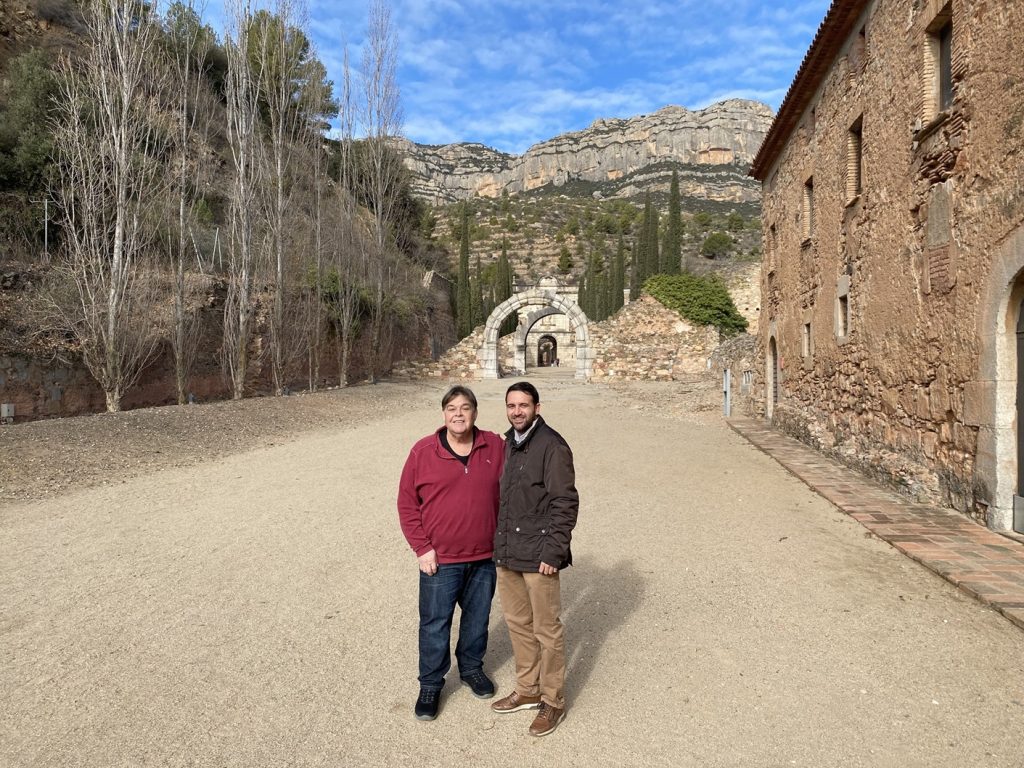
I interviewed a winemaker on the eastern side of the country who had a very interesting project. They were recreating wines in the way that wines were made 2000 years ago. Not long after that, he sent me some wine, and it was terrific.
Some months after that, things were beginning to open up, and I took a trip to Italy to visit this fellow and also explore the Abruzzo region, which is in the central-eastern part of the country and extends from the middle of the country to the Adriatic Sea. I visited the winemaker in the village of Atri; a very tiny village about seven or eight miles from the Adriatic Sea.
The people there were so lovely, and I kept saying to myself, “David, maybe the time has come for a monster change in your life.” On the third day of my visit, I rented a house. The cost was about U.S. $350 for a really lovely little apartment right in the center of this historic village.
The philosophy behind my move is that I had been doing my show for 14 years in California, and since California produces 90% of the domestically produced wine consumed nationwide, I realized that the focus of my radio program was largely centered on the California industry.
There’s a whole world out there and I was missing most of it and I had come to believe and understand that people in other parts of the world see wine very differently and they don’t pay ridiculous prices for it like we do. American consumers would be so much happier if they were enjoying wine the way their European counterparts do. I still talk about California wines because they are still my favorites by and large. But, now I am located in a place that allows me to visit dozens of wine-producing countries and share that information and lots of cultural and travel insights with my audience.
- How has the move benefited the podcast and you personally?
In my village of 11,000 people, they treat me like a celebrity just because I’m on the radio and have the podcast. I would recommend to anybody who wants to live abroad to go for a small community. In small towns ancient culture is thriving and there’s a festival almost every week and shops close down at 1 o’clock and remain closed until four so that people can enjoy the prime hours of the day.
- The series from Spain was exciting! How many road trips do you take and what do you look for in studio space when at a remote location?
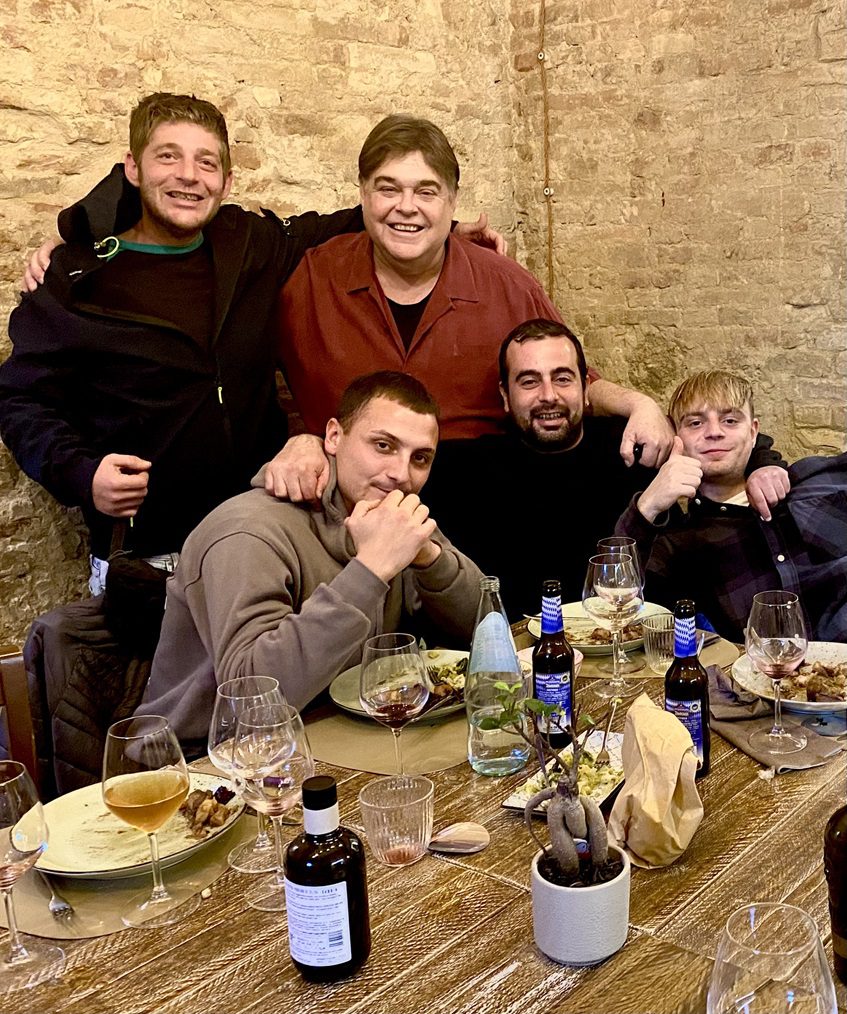
The first year and a half I pretty much remained in Italy. It takes a long time to get a residency permit here, and until you have that, you can only stay 90 days at a time. Now all that is settled and I’m starting to travel a lot more. I should point out that if I only did stories about wine in Italy, I could do that for the rest of my life and it would never get boring.
Now I’m committed to traveling once or twice a month. When I land in a particular country, I’m going to do several episodes … Usually, I try to do four or more. My next adventures will probably be in Georgia, the country, and possibly Moldova.
As far as traveling on the road is concerned, I’m a big fan of ambient sound so if I’m in a wine cellar or wine cave someplace, I want that echo … But I will tone it down during the editing process and there are some fabulous tools available to play with audio.
- Where do you record when you’re not on the road?
When I’m at home I record in a small studio in my house. Having a fancy studio is not necessary any longer. The room where I record has 3-foot thick stone walls because the building is many hundreds of years old. The acoustics are quite good inside a stone fortress! These days, I use software solutions to get great audio.
- Your recording equipment is top-tier. Are there any recommendations for our audiences?
I’m not sure if I wanna answer this question, as I would be giving away a fabulous trade secret. OK, I’m going to give your readers the best advice on the planet. Get a decent four- or eight-channel mixer. The one I use is made by Soundcraft. The mixer is connected to my Mac. I would say to anybody who’s anticipating the purchase of a computer for podcasting, it’s Mac or nothing.
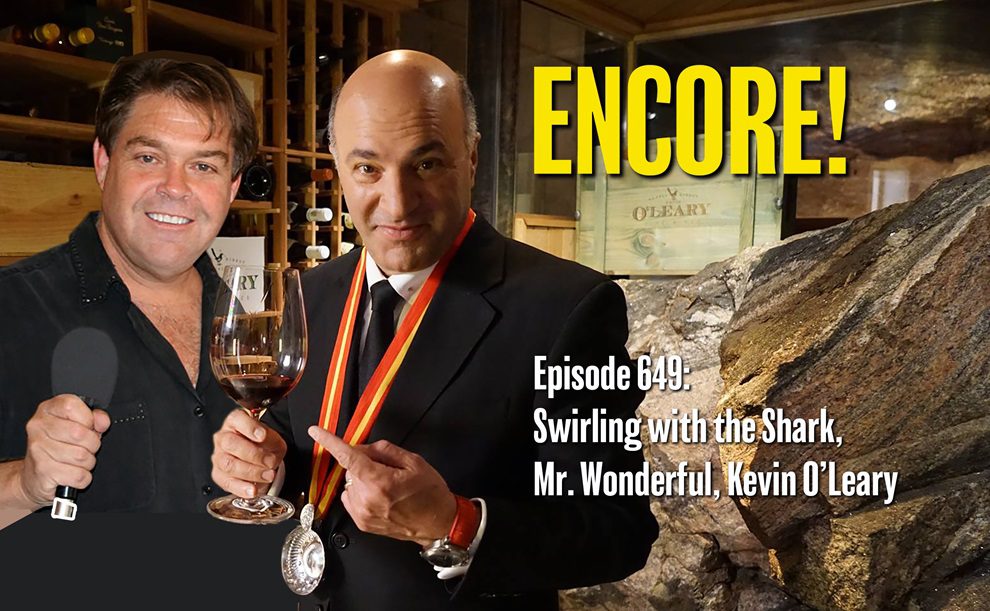
For microphones, I use the legendary SM58. This is the classic rock ‘n’ roll microphone that has been used for many decades. The reason I love this mike is because you could pound nails into a board with it. When you’re traveling and things are getting knocked around, the mic is bulletproof.
I now thoughtfully use artificial intelligence. I process all of my audio through a company called Descript. What they can do is simply out of this world. They use artificial intelligence to process audio and give you the most incredible sound. It’s the kind of quality you would get in a major studio. After I process my audio it sounds like I am in the same room with my guest.
I use a piece of software to get my volume levels perfect. I can’t stand listening to a recording that fluctuates too much. I also take out excessive silence. Not too much, but I definitely reduce the big gaps because listeners want you to keep the energy going and sometimes guests pause for a long time while they’re giving their answers to your questions.
All of these things that I do in production are a lot of extra work but I get true broadcast-quality audio. Right now the tools available to podcasters to achieve exceptional sound are just off the charts and that’s my fancy studio.
- What fun guests you have! How do you find them . . . or do they often find you?
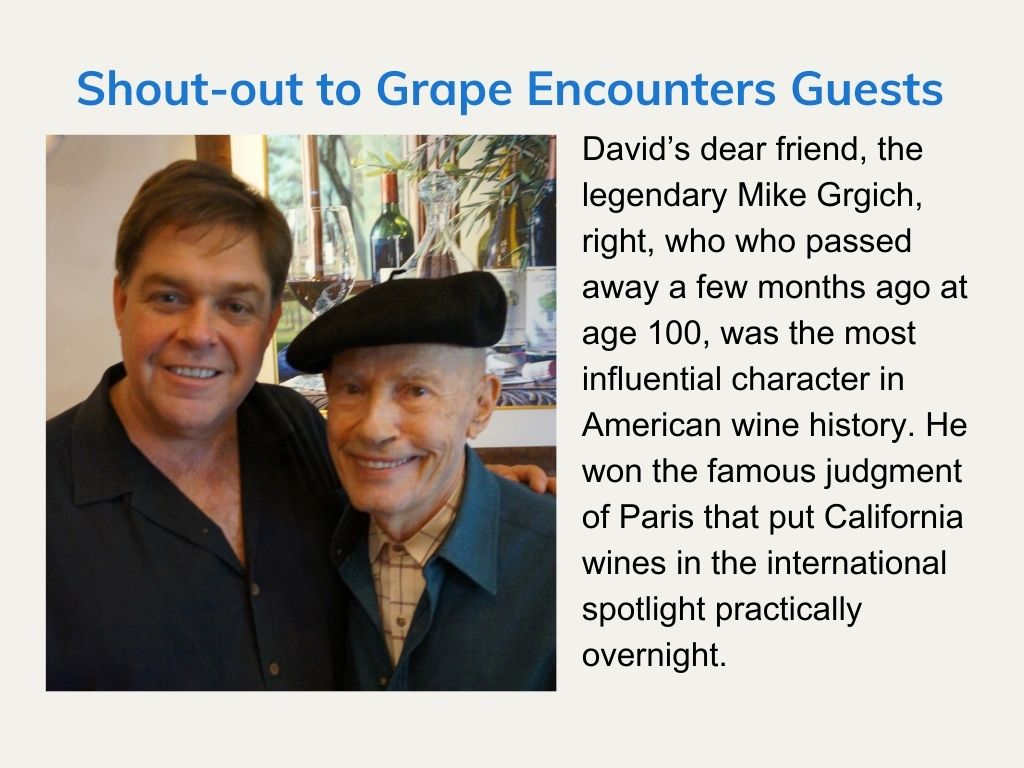
I have to admit that I really do get exceptional guests. I am very fortunate that I’ve been doing this for a long time, and the best piece of advice that I can give is to shoot for the best. Ask for top-tier people to come on your show. It helps to have a good press kit or something that gets them excited about being on with you.
The main thing is you have to develop relationships, and the most important relationships are with PR companies. Once you get on their list, you’ll start receiving press releases and the good opportunities will start coming into your inbox with any luck.
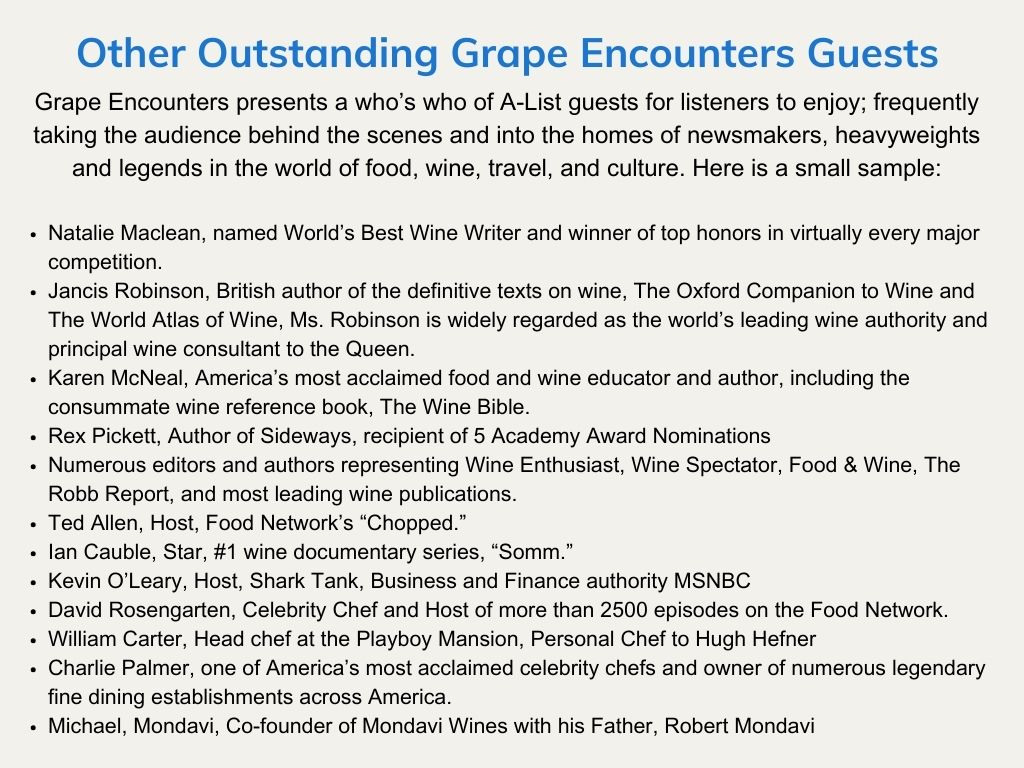
I have had the biggest names in wine ask their marketing people to contact me so I would say that I don’t really have to seek out guests for my show. But obviously, I look for unusual guests and then just go after them.
- What’s coming up?
We’re about to launch a new streamlined version of the program and that will likely use some cutting-edge advertising tools once we get it going. That’s going to happen in the next 30 days. It’s a supplement to the main program but only a couple of minutes long. We call it a microcast.





